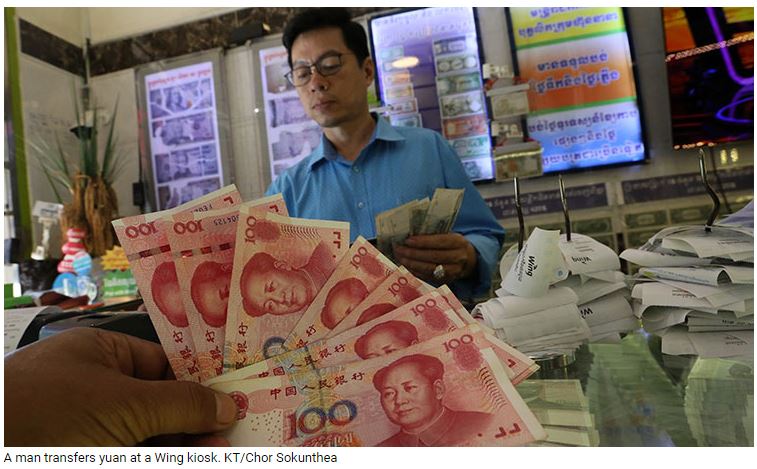Cambodia: Central Bank explains its yuan promotion policy
A representative of the National Bank of Cambodia yesterday clarified the Central Bank’s policy toward the Chinese yuan, saying that its use is only being promoted in cross-border dealings.
The explanation was given yesterday by NBC director Chea Serey and follows reports in local media that the Central Bank was encouraging the use of the Chinese currency for everyday exchanges in Cambodia.
Ms Serey was speaking to reporters during a meeting convened to set the record straight on the matter.
“We are not asking Chinese people or investors to use the yuan in Cambodia. What we want is for them to use the yuan in the banking system and in cross-border transactions,” Ms Serey said.
“We are urging Chinese and Cambodian companies to trade in yuan and riel as to avoid risks associated with currency exchanges,” Ms Serey said. “Cambodian businesses importing goods from China should pay in yuan and Chinese businesses importing goods from Cambodia should use riel.”
Ms Serey said the policy will boost the use of the local currency, the riel, abroad. “The use of the Chinese yuan in trade settlements between the two countries will also increase the use of the Cambodian currency.”
She said similar arrangements are being pursued with Asean nations, particularly Thailand and Vietnam.

KT/Chor Sokunthea
Speaking last week at a forum on the internationalisation of the Chinese yuan, also known as ‘renminbi’ (RMB), NBC deputy governor Sum Sannisith said there has been a 10 percent jump in the use of the Chinese currency in trade exchanges between Cambodia and China.
“The RMB plays an increasingly important role in cross-border trade and investment in line with enhanced cooperation between Asean and China,” Mr Sannisith said. “As an Asean nation, and due to our close relation with China, Cambodia benefits from the internationalisation of the yuan.”
NBC allows certain banks and financial institutions to operate in yuan. The Bank of China (BOC) and the Industrial and Commercial Bank of China (ICBC) are allowed to conduct operations in yuan and can act as clearing facilities.
13 other commercial banks are allowed to transact in yuan, enabling importers of Chinese products to secure more loans and allowing people paid in yuan to open bank accounts with local institutions.
Chinese tech businesses have also contributed to the rise in the use of the Chinese currency. Payment gateways like Alipay and WeChat Pay are widely used by tourists and residents in Cambodia. China’s UnionPay, the largest supplier of payment cards, is also broadly used in the Kingdom, Mr Sannisith explained.
In September 2017, the yuan-riel exchange rate was officially launched during the China-Asean Expo in Nanning, in China’s Guangxi Zhuang Autonomous Region.
According to NBC, last year Cambodia imported $5.2 billion in Chinese goods, while it exported $753 million to the East Asian giant. Of that trade, $135 million worth of settlements was carried out in yuan by Cambodian companies, while Chinese firms paid at least $70 million in yuan to Cambodian firms.
Source: https://www.khmertimeskh.com/50545687/central-bank-explains-its-yuan-promotion-policy/


 English
English




